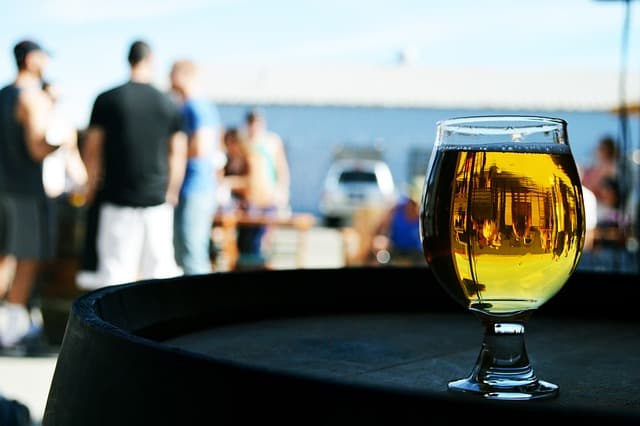Germany is the land of beer. The Bavarian Purity Beer Law of 1516 is considered the oldest law still in use in this country. There are still over 1,500 breweries in our country today. Many of them are small and very small businesses with a limited regional market. You can also find some really big breweries here.
Place 1: Radeberger Gruppe KG, Frankfurt am Main: turnover 1.7 billion euros (2019)
The Radeberger Gruppe is the largest brewing conglomerate in Germany, part of the Oetker Group. In addition to beer production, the company operates as a producer of soft drinks, a beverage wholesaler, a supplier of system solutions for catering companies, a route logistics provider, a retailer (Getränke Hoffmann) and an express delivery service. Oetker’s beer business dates back to 1952, when a controlling interest in the Binding brewery was acquired. In 2002, the Binding group was renamed the Radeberger Group. It includes more than a dozen breweries across Germany. The most famous beer brands are Hasen-Bräu, Berliner Pilsner, Tucher Bräu, Berliner Kind and Berliner Bürgerbräu. The Selters mineral spring in Selters an der Lahn also belongs to this group.
Place 2: Anheuser-Busch InBev Germany Holding GmbH,
Anheuser-Busch InBev is considered the largest brewing group in the world and was created in 2008 as part of the acquisition of American brewer Anheuser-Busch by Belgian-Brazilian group InBev. In 2019, its global revenue was $52.3 billion. Under the Anheuser-Busch InBev Germany umbrella are the group’s German breweries, which operate as their own subsidiaries: Brauerei Beck GmbH & Co. KG, Brauerei Diebels GmbH & Co. KG, Hasseröder Brauerei GmbH and Spaten-Löwenbräu GmbH. Measured in terms of beer production, Anheuser-Busch InBev Germany calls itself number 2 in the German market.
Place 3: Krombacher Brauerei Bernhard Schadeberg GmbH & Co.KG, Kreuzthal-Krombach: turnover €862 million (2019)
The history of the Krombacher brewery began back in 1803 with brewing in a local pub. In the following decades, it evolved into a major regional brewery. However, Krombacher did not become one of the largest brewers in Germany in the Federal Republic until the 1950s. Today the company has about 1,000 employees. In addition to various beers under the Krombacher brand, the company owns the Vitamalz brand and the rights to distribute Schweppes, Dr Pepper and Orangina in Germany.
Place 4: Bitburger Braugruppe, Bitburger: 792 million euros in sales (2019)
The Bitburger Brewing Group is a subsidiary of Bitburger Holding GmbH and combines the “beer activities” of the entrepreneurial Simon family. The bracket for both sisters is Th. Simon GmbH & Co. KG. The origins of the company go back to 1817. At this time the Bitburger brewery in the Eifel region was founded, which is still the main company of the brewery group today. Various breweries were added over time: Köstritzer Schwarzbierbrauerei in 1991, Wernesgrüner Brauerei in 2002, Duisburger König-Brauerei in 2004 and Licher Privatbrauerei 1854. Together the brewery group employs about 1700 people.
Place 5: Oettinger Brauerei GmbH, Oettingen in Bavaria: turnover 323 million euros (2018)
The history of Oettinger Brauerei began as Fürstliches Brauhaus zu Oettingen, and in 1956 the company was taken over by the Kolmar family, which itself has a long tradition of brewing. Oettinger Brauerei is still a family enterprise and, in addition to its headquarters in Oettingen, produces in Gotha, Mönchengladbach and Braunschweig. In contrast to other breweries, Oettinger Brauerei has achieved success through direct sales – direct deliveries to supermarkets, beverage markets and petrol stations. In addition to the wide range of Oettinger-branded beers, Oettinger beers are sold in supermarkets under private labels.
